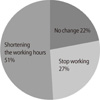Abstract
Background
Disability of Activities of daily living (ADL) is the most important factor for care of dementia patients. So Korean Dementia Association has prepared the survey for current state and cognition of active daily living in Korean dementia patients.
Methods
A total of 100 subjects were interviewed. Structured open and closed questions about ADL for dementia were asked. They are main caregivers of dementia patients who working over 5hours per day. Assessments included age, sex, education level, economic status, severity of dementia patients, pattern of the care-giving, current state and cognition of ADL, and needs of the caregivers.
Results
The cognition of ADL was very low (51%) and this is correlated with economic status. Increasing of care-giving time is the most stressful for caregivers, they frequently suffered from disability of outgoing and personal hygiene. Dementia patient's ADL disability causes serious economic losses, need of the caregivers about guide lines or education program was very high.
Figures and Tables
 | Fig. 2Prevalence of ADL disability in dementia patients. (A) Prevalence of symptoms that caregiver experienced. (B) Prevalence of symptoms that seriously bothered caregiver. |
References
1. Korean Dementia Association. Dementia A Clinical Approach. 2nd ed. Anyang: Academya;2011.
2. Yang Y, Yang HD, Hong YJ, Kim JE, Park MH, Na HR, et al. Activities of Daily Living and Dementia. Dement Neurocogn Disord. 2012; 11:29–37.

3. Mahoney FI, Barthel DW. Functional Evaluation: The Barthel Index. Md State Med J. 1965; 14:61–65.
4. Lawton MP, Brody EM. Assessment of older people: self-maintaining and instrumental activities of daily living. Gerontologist. 1969; 9:179–186.

5. Sikkes SA, et al. A systematic review of Instrumental Activities of Daily Living scales in dementia: room for improvement. J Neurol Neurosurg Psychiatry. 2009; 80:7–12.

6. Gold DA. An examination of instrumental activities of daily living assessment in older adults and mild cognitive impairment. J Clin Exp Neuropsychol. 2012; 34:11–34.

7. Alzheimer's Disease International. World Alzheimer Report. 2009.
8. Norton MC, Smith KR, Ostbye T, Tschanz JT, Corcoran C, Schwartz S, et al. Cache County Investigators.Greater risk of dementia when spouse has dementia? The Cache County study. J Am Geriatr Soc. 2010; 58:895–900.

9. Gustavsson A, Brinck P, Bergvall N, Kolasa K, Wimo A, Winblad B, et al. Predictors of costs of care in Alzheimer's disease: a multinational sample of 1222 patients. Alzheimers Dement. 2011; 7:318–327.





 PDF
PDF ePub
ePub Citation
Citation Print
Print







 XML Download
XML Download